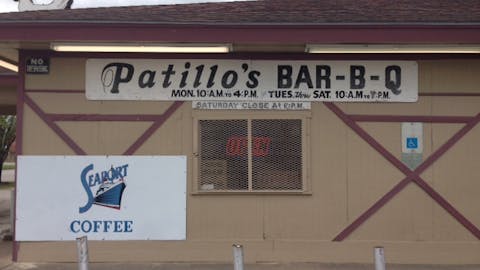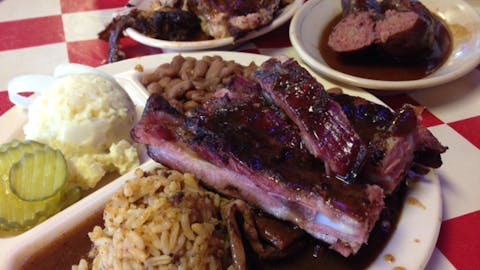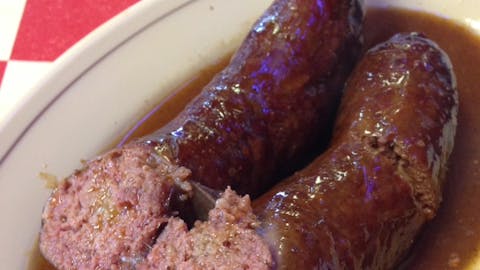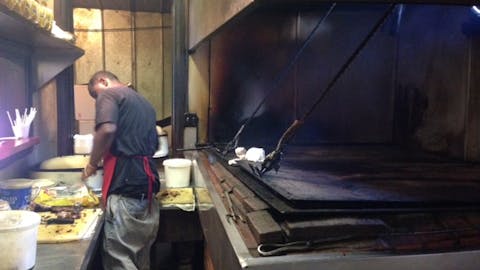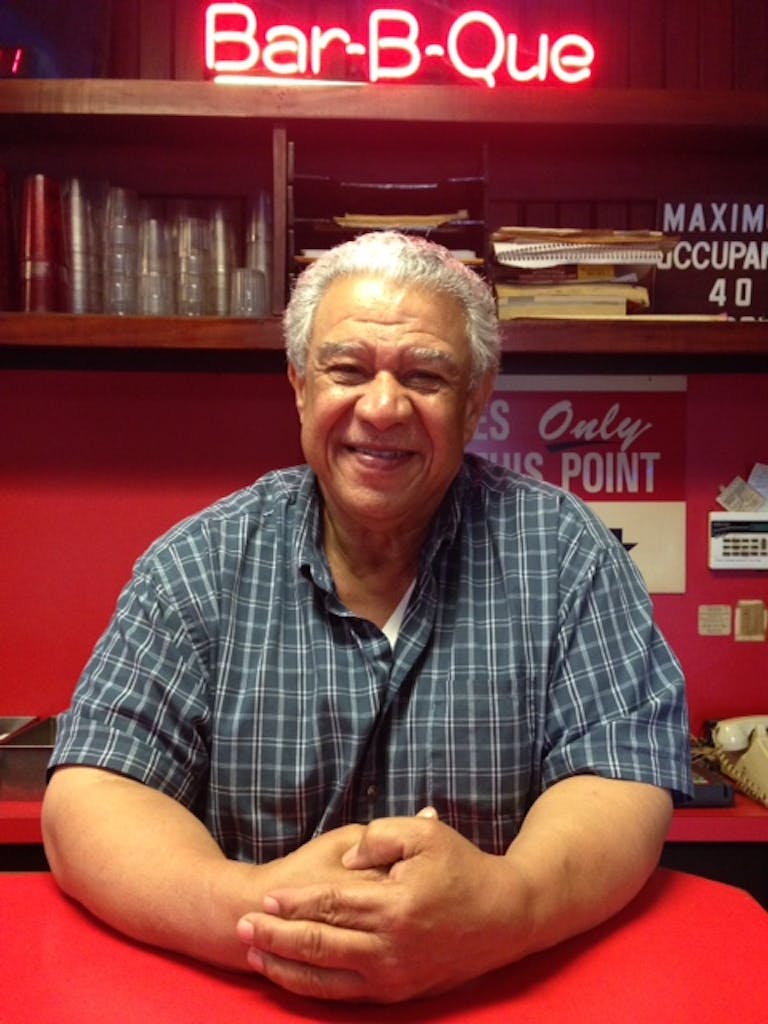 Owner: Patillo’s Bar-B-Q; Opened 1912
Owner: Patillo’s Bar-B-Q; Opened 1912
Age: 67
Smoker: Indirect Heat Wood-Fired Pit
Wood: Hickory, red oak, white oak, and pecan
Patillo’s Bar-B-Q has been operating in Beaumont since 1912. It has moved around a lot in the past 100 years, but it’s always been in the family. That makes it the oldest family owned barbecue establishment in Texas, and also the oldest black owned barbecue joint in the state.
The only place you’ll find brisket here is within the beef links. The sliced beef on the menu is all clod. Those links are made from a recipe older than the business, but one that exemplifies barbecue in Beaumont. The beef is ground with garlic, chili powder, salt, pepper, and a few other spices before being stuffed into beef casings and smoked. You’ll only find them in southeast Texas, and they probably originated in Beaumont.
Robert Patillo started working here when he was in his early teens, and now runs the place. He’s older than your average retiree, but plans to keep working for at least another decade. We sat inside the restaurant in the mid-afternoon while I tried to work my way through the menu.
Daniel Vaughn: If you look back at all the barbecue joints across the state, this is one of the oldest.
Robert Patillo: That’s right. Great-grandpa started the business in 1912.
DV: What was his name?
RP: Jack Patillo. My grandfather’s name was Frank Patillo, but they called him Little Jack. He added Jack to his name so it was like Jack Jr. Then my father came along and he was Frank Patillo Jr. because his dad was really Frank Sr. After my father, I took it over, but when I started working it was for my grandfather.
DV: Where was the first location for the business?
RP: The first one was at the corner of Park and Bowie. The storm in 1915 washed the little building away. Then, he rented from the Lombardos at the corner or Orleans and Forsyth where the municipal court is now. That was long before the White House store was there. It was a dry goods store. In 1925 they built the White House store, so he moved down between Neches and Trinity Street on Forsyth. The Star Theater was there too. That was a block that had a lot of other black businesses. My grandfather had what I would call a stall there. His sister was on the other side of the theater with Maurine’s Coffee Shop, then Maurine’s Catfish. On the other side of my grandpa was his older sister Cleo. She ran a café and barbecue deal there.
DV: You called it a stall…
RP: You know, when you go lease one of these properties in a shopping center.
DV: It was an enclosed building with a dining area?
RP: Yes. They’ve all been enclosed buildings as far as I know. In 1935 my grandpa bought the first property he owned himself at Forsyth and Railroad. He ran that place from 1935-1950. In 1950 he built this building and came here. He left my dad over at the Railroad location.
DV: This building was built to be Patillo’s Bar-B-Q?
RP: That’s right. It’s hasn’t been anything else. In 1981 my dad died of cancer and I took over his location. When my dad was dying of terminal cancer I went to work with him. I was working forty hours a week at the hospital, then going there to help my dad, and I was putting in at least 12 hours a week at Lamar. I finally quit my job.
DV: Wow.
RP: I had a busy schedule, but it kept me out of trouble. I’ve never seen the other side of a jailhouse. Then in 1982, I purchased this building from my uncle. He had originally wanted his daughter to run it, but she had a nursing degree and her husband was a hospital director. They came back anyway, and it eventually cost them their marriage. Running a business is hard, especially when you have three kids. My uncle and my grandma both called and said “Hey Robert, you need to come take over Washington.”
DV: Then you had two restaurants to run.
RP: That was his dying wish, to keep the business going and keep the property until the city would buy it to make way for M L King Parkway. At that time there was a railroad track, and he knew they were going to move the tracks and make a nice parkway.
Robert’s brother Frank stops by the table to discuss a load of gravel coming in for the parking lot.
RP: That’s my brother. He never wanted any part of this. He likes being free.
DV: How many siblings do you have?
RP: I only have one brother and one sister. Neither one of them wanted to work here. They had enough of it when they were younger and forced to come here and work. It wasn’t easy. Your fingers would be sore. Anyway, in ’87 or ’88 they finalized the purchase of the property on Railroad, so I bought the property on 11th Street and stayed there until 2010. That’s when Jack-in-the-Box decided they wanted to purchase it. With what they offered, I could not refuse, and I was 62 at the time. God sends you blessings in the strange ways. In the meantime, I’d sold this place to one of my nephews. He was retired from the military, and he thought it would be easier. Now he lives in Ohio and he has our seasoning mix in H.E.B. and in Spec’s. I came back here, the same place I started working when I was 13. I’ve been here ever since. I like it here. If God puts something in front of me, I better jump on it. I don’t plan on retiring soon. I want to be here a while, maybe ten more years.
DV: Back when you were 13, do you remember what was on the menu?
RP: You could buy a link for $1. I wish I could find some of those old menus. We always had ribs and chicken. Homemade links have always been the staple.
DV: So, when Jack started, did he have a link recipe already?
RP: Oh yes, from day one. His mother had a lot of kitchen knowledge from her mother who had worked for the McFaddens. They were already making sausages way back when. She developed the all beef link, and that’s the way it has always been made. As kids we spent a lot of time around the barbecue. We were very young, washing dishes at 10 or 12 years old. We had to help out. That might be tying the strings on the casings for the links.
DV: You make those links from scratch, right?
RP: Yes. We buy the casings in bulk and we run them. That means we put them in water – they’re already clean from the supplier – and we wash out the salt real good. We cut them to a certain length to make the links.
DV: You stuff each link individually? You don’t stuff a big long line of them at once?
RP: Yes. After we cut them, we stuff them. We grind our own meat here, and we’ve done that always. We use mostly brisket and the trimmings off our shoulder clod. We serve a lot of shoulder clods here. It’s not some mix of 75% this or that. I know what’s going in it.
DV: So you don’t always know exactly how much fat is in the mix?
RP: Well, there’s very little. If the meat looks too fatty, we’ll grind it up for the jambalaya stock for the rice. It gives it a natural fat.
DV: Do you consider the link specific to Beaumont, or more of a southeast Texas style?
RP: It’s more of a Southeast Texas style, but I guess you could say Beaumont too. I have people calling me from all over asking me to send links. We don’t do that yet, but if you’ve been to Beaumont and you’ve eaten here then you’ve had the links.
DV: Do you believe your family to be the ones who introduced the beef link recipe to this area?
RP: I’m going to be honest with you. Patillo’s was first. Then the Simpsons had a place across the street from my grandfather. Simpson would come over and use the grinder. They were friends. At that time, Simpson had the bulk of the black business. Grandpa was the only one that hung in there with it.
DV: I’ve read about a man named Matt Garner bringing a similar link recipe from Beaumont to Houston. Do you know of Matt Garner?
RP: Matt Garner, I think he had one in Galveston. He was right there on the seawall.
DV: Did he have a restaurant here in Beaumont?
RP: Not to my knowledge. There was also a Garner that had a place in Orange. There was also black fella who was a friend of my grandpa, Charlie Rosenthal. My grandpa helped him with his links. Even Mr. Gerard [founder of nearby Gerard’s Barbecue], he and my grandpa were good friends. He had a link, but it was too juicy. He taught him how to make a better, firmer link. When they were in the south end of Beaumont back in the day, they’d call them grease balls or garlic balls. We eat them, so I don’t want them to ruin my cholesterol level. I’ve got to eat those links to make sure they’re good. I even taste a spoonful of the raw meat after its ground up and the seasoning is mixed in. I don’t spit it out.
DV: How many links do you make here?
RP: Today he just ran off 500 of them.
DV: How many days does that last?
RP: A couple days. We go through links. Links and ribs and chickens.
DV: Are the links the most popular menu item?
RP: Very much so.
DV: What’s second on the list?
RP: Ribs. I go through twenty cases a week.
DV: You said that link recipe came from Jack’s mother. Is that where the sauce recipe came from too?
RP: Yes, from her.
DV: What is the base of the sauce? Is it a stock or just water?
RP: It’s just water.
Frank comes back to the table to talk with Robert.
Frank Patillo: I can take you back to Patillo Road in Orange, but you don’t want to get into all that mess. Tell him about that.
RP: That’s where our roots come from. Lakeview Cutoff Road where Mr. Pattillo had his home. He called it Four Oaks Ranch. It was north of Vidor. Some of his sons settled in Orange. Go back to my great-great-grandpa. His daddy had nine boys with his first wife, and she died. There was this black lady. They said she was from one of the islands. She ran a laundry on Collier’s Prairie here in Beaumont. He coaxed her into coming up there and helping him raise those children. She went up there and had three boys with him. My great-great grandfather was their offspring.
DV: And his dad was white?
RP: Yes. You can get it all in the library. George Alexander Pattillo. He was a very big man. I saw some pictures of him. He fought in the Spanish American War. That’s how they got all that property.
DV: So, your family members were native Texans from way back.
RP: Oh, Lord yeah. My great-grandfather’s home is at Corley and Avenue F. It’s still there. In fact we’re trying to get a historical marker for the old Patillo home. That was my great grandfather’s first family, you see? My grandfather came from his second family that was at 907 Franklin. That house is still there too. It’s the only big house on that side of the street. That lady’s name was Roxy Patillo. Her daddy was a white guy too, and Englishman, and their mother was a descendent from one of the McFadden’s family.
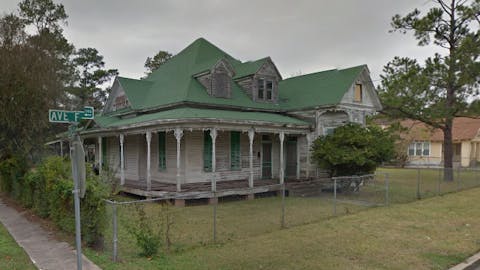
DV: How do you identify yourself?
RP: I’m black. Back in the time when I was born, there wasn’t any mixed, you were black or white.
DV: And if you weren’t white, you were black.
RP: Right. But I’ve got cousins who are fairer than you, but they’re black too. We weren’t trying to be someone else. Our mothers were women of color.
DV: You’re family ran this business through segregation. Did you have both white and black customers?
RP: It was a black owned business. There was a place in the back that was a dining room for blacks. Black folks around here back then barely had enough money to buy the links. Whites weren’t denied accessibility wherever they wanted to go. At the Railroad location, there was another little dining room in the back. My grandfather didn’t do that to spite his own color, don’t misunderstand me. It was all economics. We wouldn’t have prospered or accomplished what we have. You have to go with the times. The minute things were integrated we went right with it. We were glad. It helped us and made business a lot better. Our main contention was that you come in here and be civil and be able to eat with someone who’s a different color across from you. That was the only thing we were worried about. I mean, have you ever seen a different color of money?
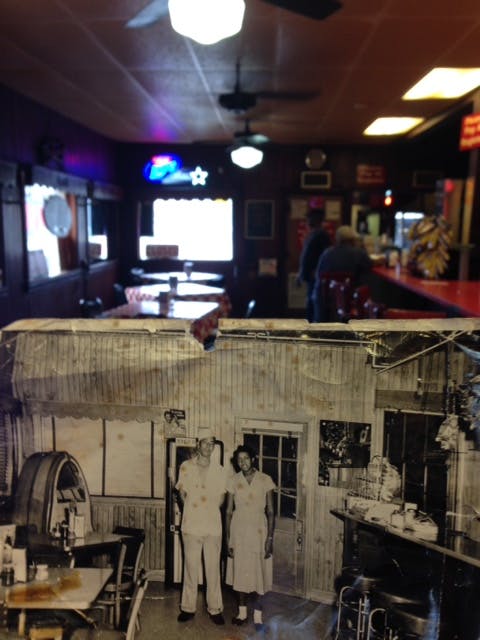
DV: Did you ever see any problems in the restaurant related to race?
RP: I think my grandfather did with a friend of his. They grew up together. The young man went off to school and became a doctor. It was Dr. Sprott. They had a few words, but it wasn’t long after that when everything was integrated.
DV: I’ve read that the business had to close briefly a few years back. Why was that?
RP: We closed for a bit when we sold to Jack-in-the-Box. When they want something, they want it now. I closed and came over here. We spent six months putting on a new roof, this used to be flat roof, then we added some bathrooms and I took a little vacation. I took a cruise and went to visit the family in California.
DV: Do you still do much cooking here?
RP: I’m more of the supervisor. I go around tasting things and watching. Most of my people have been here for years.
DV: Who does most of the barbecue cooking?
RP: The young man back there. Quincy. The sauce mixes and stuff, I don’t divulge that. I mix them and have them back there in the shelf. All they have to do is dump it in. The link mix is all mixed too.
DV: In the links, there’s obviously a lot of garlic. Is there chili powder in there too?
RP: Yep. Chili powder, black pepper, red pepper, you name it. It’s close to the seasoning you’d put into a pork smoked sausage, but we stay away from oregano or other herbs.
DV: This place has been around so long, do you know why it doesn’t get the notoriety of other barbecue places that aren’t as old?
RP: You know, it’s all about the money. After all that, we’re still in Beaumont. After I got to be a certain age, I don’t want to have that stress on me. I don’t have any children. I have my nieces and nephews. I’m seventy-six years old, and I don’t feel like jumping hurdles. I would have loved to have a chain when I was younger.
DV: It amazes me that you’ve been able to keep making these recipes the same way for over 100 years. How did you keep from having outside influences change them up?
RP: It didn’t change many hands. It’s in the same family, and that’s the key. When you’re raised in this family, you learned it all from scratch and you made it all from scratch.
- More About:
- Black BBQ


